高中英语 Unit 3《A taste of English humour》教案5 新人教版必修4
高中英语Unit3AtasteofEnglishhumour培优练习(含答案)

Unit 3 A taste of English humour培优练习Ⅰ.阅读理解AA nation's humor is linked to the historical development of the country. How funny somebody finds a certain thing depends on many things including ages,personal experiences,levels of education and locations. Therefore,humor is something that is not always transferable (可转移的) in another country.What about when both countries speak the same mother tongue?Does that mean they will then share the same sense of humor,or can differences still take place?Let's take the example of Britain and America. Time and time again,people say that Brits and Americans don't “get” each other's sense of humor. It is often argued that one of the most common differences between the British and American sense of humor is that Americans don't understand irony (反话).Simon Pegg explores this topic in depth in his article What Are You Laughing At?He concludes that this statement isn't true and I agree with him.In fact,Brits use irony on a daily basis while Americans don't. I think Americans understand British irony (most of the time anyway);what they don't understand is the need to use it so frequently. When Americans use irony,they tend to say that they are “only kidding”.They feel the need to make a joke more obvious than Brits do. Maybe this comes from a fear of offending (冒犯) people.The American sense of humor is generally more slapstick (闹剧的) than that in Britain. I think this arises from a cultural difference between the two. Their jokes are more obvious and forward,a bit like Americans themselves. British jokes,on the other hand,tend to be more subtle.This may stem from the fact that British culture is more reserved (矜持的) than American culture.1.What does Paragraph 1 mainly show?A.Humor is difficult to get.B.Humor is influenced by culture.C.Not all people have a sense of humor.D.It is important to have a sense of humor.2.What is the author's point of view in Paragraph 2?A.Americans don't get Brits' humor.B.Americans know how to use irony.C.Simon Pegg is professional in using irony.D.Britain and America share the same sense of humor.3.What can we learn about Brits and Americans from Paragraph 3?A.Americans' jokes often offend people.B.Brits' irony is not easy to understand.C.They are different in how often to use irony.D.They are not sure about the need to use irony.4.What does the underlined word “subtle” mean?A.Hidden. B.Funny.C.Obvious.D.Special.BHobbies in general are becoming something of the past. Our lives are already filled with classes,homework,working,relationships and sleeping. When we do have a spare moment,it is all too easy to spend it on the endless entertainment and media that are right at our fingertips.I do not doubt that there are some people who could become a great writer or musician. I only fear that so many people are busy pursuing their education and their careers,but they never even see the potential (潜能) they have. The next great photographer or singer could be going to college right now. But they might not even know they have a gift for photographing or singing if they've never picked up a camera or a guitar.Of course,the final goal of pursuing a new hobby shouldn't be to become rich and famous. For most people,a hobby is just something they enjoy doing for the purpose of the thing itself. Such hobbies are still very useful. Studies have shown that people who have a hobby are less likely to have stress and more likely to have more meaningful lives.Most importantly,a hobby is just something you do to make you happy. I hate to break it to you,but we all have a long lifetime of work and stress ahead of us. It will make things much easier if we can practice the piano or make some collections after work.Sure,it's not easy to start a new hobby while going to school,but it will likely never get easier than it is right now. So think about the thing that youhave always wanted to try but were too embarrassed or busy or whatever. You never know,you might become the world's next great people. If not,you'll at least be a little more well-rounded,more interesting and less stressed.5.What does Paragraph 1 mainly show?A.All people should learn to relax.B.Today's people have little time for hobbies.C.People in the past took their hobbies seriously.D.People's lives have been negatively affected by media.6.What does the author think of hobbies?A.They may take up too much time.B.They can help us enjoy a better life.C.They sometimes can bring us stress.D.They should make us famous one day.7.What does the underlined sentence in the last paragraph mean?A.We should start a hobby now.B.Starting a new hobby isn't easy.C.We'd better develop a hobby at school.D.Developing a hobby will get easier as time goes by.8.What's the author's purpose in writing the text?A.To introduce some helpful hobbies.B.To encourage us to have a hobby.C.To tell us how to create a happy life.D.To tell us how to find our potential.Ⅱ.阅读七选五Having good study habits is key to success in college. 1 To begin making the change,you need to get organized to study.Create a fixed study space. Find a quiet space in your room or somewhere on campus where you can focus. Studying in the same place every day makes your brain combine a certain environment with work. 2Find a regular time for studying. If you study at the same time each day,your brain will be prepared for learning when you sit down. Review your schedule and see when you have free time. 3 You can study during gaps between classes or in the evening after your classes are done for the day.4 Make sure you have everything you need to study at your study space.If you're studying in a place in your home,keep things like your books,pencils,pens,and paper in that area. If you go out to study,you can take a book bag and keep all your studying materials stored there.Avoid distractions (干扰).When you prepare your study space,it's important to keep it away from distractions. Remove any technologies that will take your mind off your work,like your iPad. 5 Besides,keep other distracting materials such as outside reading,away from your study area.A.Organize your materials.B.Start with difficult material first.C.Your room may be an ideal place for studying.D.This will help you quickly get into the state of study.E.Schedule an hour or two for studying during those times each day.F.However,many students find their former study habits are not suitable for college.G.You can also use apps to stop distracting websites like Facebook while you're studying.Ⅲ.语法填空I was only in China for about 4 months last year. I stayed in Shanghai and visited some other cities 1.(include) Beijing. While the price feels a bit too much for a high speed train,the Chinese infrastructure (基础建设) is 2. (true) far ahead of any other developing country and even some developed ones in Europe. The train stations are as big 3. airports:almost everything in 4. (they) is like airports. They have all the high standards of airports but without the waiting time. The trains are just like those from Germany or France,5. are clean,modern and highly developed and run at very high speeds. It is about 1,200 kms from Shanghai to Beijing,and each high speed train 6. (take) around 4 and a half hours to reach its destination and 7. are more than 2 trains every hour,each day.I also had the experience of 8.(sit) in Maglev (磁力悬浮列车) in Shanghai. There is a public maglev train that runs from Shanghai city to its international airport. The 9.(distant) from the city to the airport is 40 kms and the speed of the train is 430 kms/hr. It took us just around 6 mins 10. (cover)40 kms and it felt rather smooth.答案及解析Ⅰ.阅读理解A【语篇解读】 本文为说明文,话题是社会文化类。
(完整版)高中英语人教版必修四Unit3ATasteofEnglishHumourlanguagePoints教案系列一

Unit 3 A taste of English humourLanguage points教案Teaching goals1.Target languagea. Humour, comedy, content, performer , astonish , fortunate, ordinary, bored, entertain , throughout, homeless, moustache, worn, failure, overcome, leather, pick out.b Make Ss get knowledge of the new words and phrases.2.Ability goalsGet Ss to use some useful new words and expressions correctly.Enable Ss to make sentences with the useful sentence patterns.3.Learning ability goalsTo help students master the important language points.To help students to make sentences by using the words and phrases.Teaching important pointsGet Ss to master the usage of the words and phrases.Teaching difficult pointshelp students get knowledge of the language points.Teaching methodsInspiration, Questioning and Discussion.Teaching aidsA computer, a projector and a recorder.Teaching proceduresStep I , review the new words and phrases.Step II. Teaching the important language points一.词语辨析1. specially / especially / particularly【解释】specially = on purpose故意地;专门地 (不是为了别的,而只是为了某一目的而专门采用的某种方式。
高中英语真题:Unit3AtasteofEnglishhumour_16

Unit3AtasteofEnglishhumour李仕才一、阅读理解。
Two of the saddest words in the English language are “if only”. I live my life with the goal of never having to say those words , because they convey regret, lost opportunities, mistakes, an d disappointment.My father is famous in our family for saying, “Take the extra m inute to do it right.” I always try to live by the “extra minute” rul e. When my children were young and likely to cause accident s, I always thought about what I could do to avoid an “if only ”moment, whether it was something minor like moving a cup fu ll of hot coffee away from the edge of a computer, or somethin g that required a little more work such as taping padding (衬垫) onto the sharp corners of a glass coffee table.I don’t only avoid those “if only” moments when it comes to sa fety. It’s equally important to avoid “if only” in our personal rel ationships. We all know people who lost a loved one and regr etted that they had foregone an opportunity to say “I love you” or “I forgive you”. When my father announced he was going t o the eye doctor across from my office on Good Friday, I toldhim that it was a holiday for my company and I wouldn’t be th ere. But then I thought about the fact that he’s 84 years old an d I realized that I shouldn’t give up an opportunity to see him.I called him and told him I had decided to go to work on my da y off after all.I know there will still be occasions when I have to say “if only”about something, but my life is definitely better because of my policy of doing everything possible to avoid that eventuality(可能发生的事). And even though it takes an extra minute to do something right, or it occasionally takes an hour or two in my busy sche dule to make a personal connection, I know that I’m doing the right thing. I’m buying myself peace of mind and that’s the bes t kind of insurance for my emotional well-being.1.Which of the following is an example of the “extra minute” ru le ?A. Start the car the moment everyone is seated.B. Leave the room for a minute with the iron working.C. Wait for an extra minute so that the steak tastes better.D. Move an object out of the way before it trips someone.2.The author decided to go to her office on Good Friday to __ ________.A. keep her appointment with the eye doctorB. meet her father who was already an old manC. join in the holiday celebration of the companyD. finish her work before the deadline approaching3.The underlined word “foregone” in Paragraph 3 is closed in meaning to “_________”.A. abandonedB. lackedC. avoidedD. wasted4.What is the best title for the passage ?A. The Emotional Well-beingB. The Two Saddest WordsC. The Most Useful RuleD. The Peace of Mind【文章大意】这篇文章主要讲解的是作者对于最悲哀的两个单词if only 的理解及看法。
高中英语必修四unit3词汇短语详解
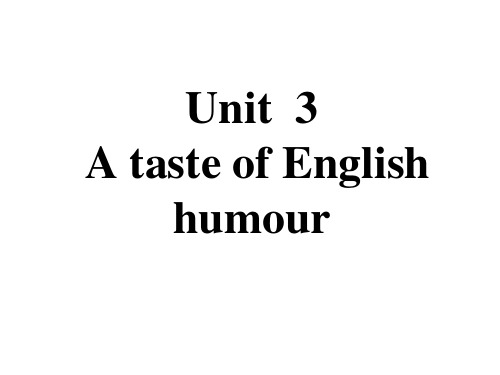
• • • • • • • • • •
11.adj. 无家可归的 11.homeless 12. moustache 12.n. 小胡子 13.adj. 用旧/破烂的 13.worn 14.n. 失败(者) 14.failure 15.overcome 15.v. 战胜;克服 16.leather 16.n. 皮革 17.chew 17.v.嚼碎;咀嚼 18.convince 18.v. 使信服 19.adj. 令人信服的 19.convincing 20.v.导演,指示,指挥 20.direct
Unit 3 A taste of English humour
• • • • • • • • • •
1.adj. 满足的 n. 满足 1. content 2.n. 表演者/演出者 2.performer 3.astonish 3.v. 使惊诧 4.adj. 令人惊讶的 4.astonishing 5.adj. 幸运/吉利的 5.fortunate 6.unfortunately 6.adv. 不幸地 7.adj. 平常的,普通的 7. ordinary 8.bored 8.adj. 厌烦的 9.entertain 9.v. 使欢乐,款待 10. prep. 遍及;贯穿 10. throughout
• • • • • • •
21. adj.杰出的 21.outstanding 22.Switzerland 22.n. 瑞士 23.n./v. 姿态;手势 23.gesture 24.adj.特殊的 n.细节 24.particular 25.n. 时刻,场合 25.occasion 26.n. 预算,开支 26.budget 27.actress 27.n. 女演员 • 28.v.& n.滑动;幻灯片28.slide • 29.直到现在 29.up to now • 30.对…满意 30.be content with
高中英语必修四-Unit 3 A taste of English humour
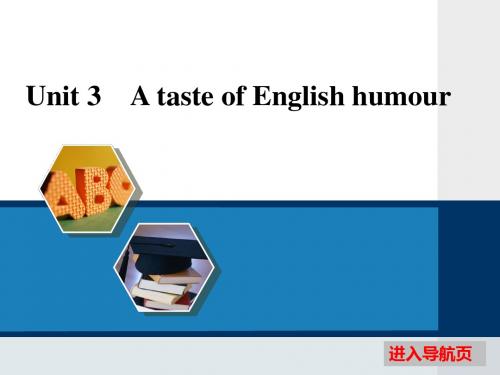
A taste of English humour
进入导航页
NO.1
NO.2 NO.3 NO.4
自主学习· 对知识面的辐射要宽
师生共研· 对知识线的归纳要清
课堂评价· 对知识点的掌握要实
课后训练· 对答题能力的培养要专
Ⅰ.单词—在语境中默写,在联想中积累
[写得准]
1. content adj.& n.& vt. 满足的;满意的;满足;使满足 2. comedy n. 4.overcome vt.& vi. 5. outstanding adj. 喜剧 战胜;克服 突出的;杰出的;显著的 3. throughout prep.& adv. 遍及;贯穿;到处;始终;全部
[用得活]
用所给词的适当形式填空 1.According to my own understanding, a good teacher is also a good performer (perform) in class. 2.The play was so humourous (humour) that the audience laughed all the way through it. 3.After school, she directly went off in the direction of the cinema to see the new film directed by the famous director .(direct) 4.The children in the mountain village have no entertainment , so their teachers often tell entertaining stories to entertain them after class.(entertain)
高中英语 Unit 3 A taste of English humour S

感顿市安乐阳光实验学校Unit 3 A taste of English humour Section ⅠⅠ.根据句意和汉语提示写出单词1He had ______(克服) the difficulties with his English before he went abroad.2He used to hope to go abroad,but now he is ______(满意的) to stay his present position.3We should satisfy ourselves with the living conditions—many families are much ______off(穷的) than we are.4I'm ______(确信的)that he will come to see you tonight.5Who will ______ in the new film directed by Zhang Yimou?6The interesting film is______(导演)by Feng Xiaogang.7All of us were______(使欢乐)by the humorous story.Ⅱ.单句改错1No one is content for what I have done._________________________________________________________________ _______2I'm sure I can convince him agree with our plan._________________________________________________________________ _______3Mom cut down some flowers from the bush._________________________________________________________________ _______4The moment I saw him in the crowd,I picked out him._________________________________________________________________ _______5This area is bad off for doctors and nurses._________________________________________________________________ _______Ⅲ.单项填空1Some people ______ themselves by reading;others have been ______ by the radio and television.A.entertain;entertainedB.interest;entertainedC.amuse;delightedD.excite;amused2He ______ me of the difficulty of the work he was doing.A.allowed B.encouragedC.convinced D.believed3______,I have never seen a better film than the one I saw last year.A.Therefore B.Up to nowC.Thanks to D.These days4The teacher told the pupils to sit up ______ in class and listen to him carefully.A.direct B.directlyC.straight D.straightly5The electricity was ______ several days ago.A.cut down B.cut offC.cut up D.cut in6With the help of other people,the people in the south of China ______ the most difficult time in recent 50 years.A.overcame B.sawC.found D.directed7I like the programme of BBC English but sometimes I can't ______ on my radio.A.pick out it B.pick it outC.pick it up D.pick up it8As there's no butter,we must ______ ourselves ______ dry bread.A.content;with B.satisfy;toC.meet;with D.be content;withⅣ.翻译句子1到目前为止,我还没有收到他的来信。
人教版高中英语必修四 Unit3 A tasteof English humour-词汇篇(学生版)

人教版高中英语必修四 Unit3 A tasteof English humour-词汇篇(学生版)face.他对这次竞赛中获得第二名很满意,因此脸上露出了满意的微笑。
2. break into强行进入,破门而入;撬开(汽车等);突然开始(笑、哭)break away from摆脱;脱离,背叛(政党、国家等) break down出故障;失败;垮掉break in强行闯入,打断break out爆发;突然发生break through突围;突破break up粉碎;结束;散开;(学校)期终放假break off断开;停顿;突然中止E.g. The thief broke away from the police and ran into the woods.小偷摆脱了警察跑进了树林。
E.g. Don't break in while others are speaking.别人讲话时不要插话。
E.g. The car I was in broke down, so I had to walk home.我坐的车抛锚了,所以我不得不走路回家。
E.g. A big fire broke out in the town last night.昨天晚上镇里着了大火。
E.g. The meeting broke up without a result.会议没有得出结果就结束了。
E.g. Strong will can almost break through everything.顽强的意志几乎可以战胜一切。
3. persuade/convincepersuade 着重利用督促、劝告来感动和影响听者,使其愿意相信某事或参与某种行为E.g. I persuade him to quit smokingconvince指用理论、证据等理智方面的因素使别人相信4. as/withAs (conj.)随着,常用来引导时间状语从句With(prep.)随着,后接名词或复合宾语,不引导从句E.g. He gave me so many facts that convinced me.三、要点梳理1. content(1)adj.满足的;满意的①We shouldn't be content with the achievements already gained.我们决不能满足于已取得的成绩。
人教版高中英语必修四Unit 3课文翻译
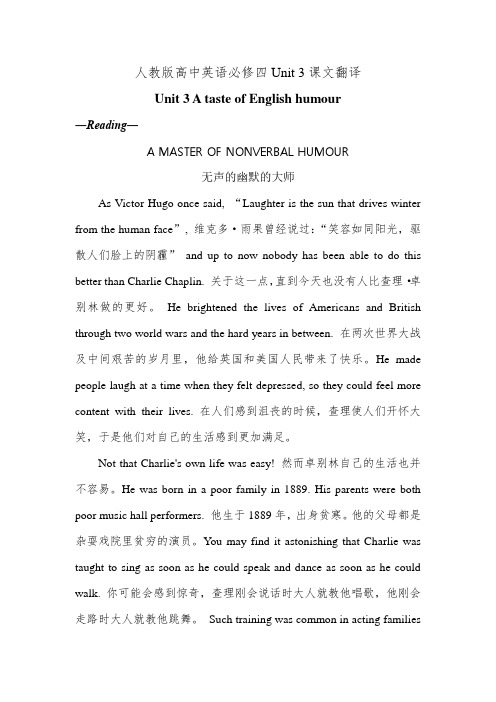
人教版高中英语必修四Unit 3课文翻译Unit 3 A taste of English humour―Reading―A MASTER OF NONVERBAL HUMOUR无声的幽默的大师As Victor Hugo once said, “Laughter is the sun that drives winter from the human face”, 维克多·雨果曾经说过:“笑容如同阳光,驱散人们脸上的阴霾”and up to now nobody has been able to do this better than Charlie Chaplin. 关于这一点,直到今天也没有人比查理·卓别林做的更好。
He brightened the lives of Americans and British through two world wars and the hard years in between. 在两次世界大战及中间艰苦的岁月里,他给英国和美国人民带来了快乐。
He made people laugh at a time when they felt depressed, so they could feel more content with their lives. 在人们感到沮丧的时候,查理使人们开怀大笑,于是他们对自己的生活感到更加满足。
Not that Charlie's own life was easy! 然而卓别林自己的生活也并不容易。
He was born in a poor family in 1889. His parents were both poor music hall performers. 他生于1889年,出身贫寒。
他的父母都是杂耍戏院里贫穷的演员。
You may find it astonishing that Charlie was taught to sing as soon as he could speak and dance as soon as he could walk. 你可能会感到惊奇,查理刚会说话时大人就教他唱歌,他刚会走路时大人就教他跳舞。
必修四Unit3 A taste of English humour——感受英语的幽默
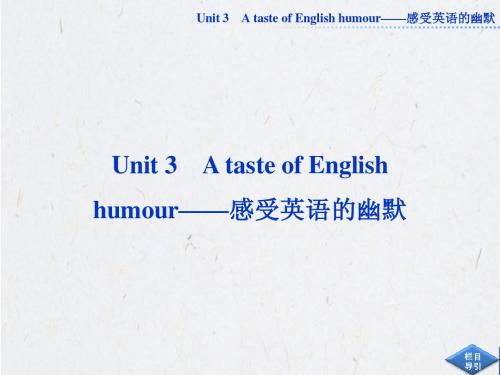
make readers laugh.
栏目 导引
Unit 3
A taste of English humour——感受英语的幽默
2.Jim had an accident yesterday. Fortunately ____________(幸运的是)he was not badly hurt. 3. Because of the war,many people became ____________(无家可归的) in homeless Libya.
sth.可知应用过去分词fixed。
栏目 导引
Unit 3
A taste of English humour——感受英语的幽默
5.(2012· 陕西教学质量检测)It looks like my cousin,but I don’t remember him__________a pair of glasses. A.to wear C.wear B.wore D.wearing
栏目 导引
Unit 3
A taste of English humour——感受英语的幽默
解析:选D。考查非谓语动词。句意为:
——和Mr. Smith说话的人是谁?——是
来我们公司采访发生的事情的当地记者。
答语是来回答who的提问,中心词是a local
journalist,后面的部分作定语来修饰
栏目 导引
Unit 3
A taste of English humour——感受英语的幽默
8.Seeing my arrival,he came over whispered and ______________(低语) something in my ear. 9.As a musician he was a
人教版英语必修四Unit 3 A Taste of English Humour

direct sb. to do/ that sb. (should) do 指导/指示某人做某事 in all directions/ in every direction 四面八方
direct adv. & directly adv.& conj. direction n.
直接,径直& 直接地,立即;一…就 方向,指导,用法说明,操作指南
2020/04/13
4U3 A TASTE OF ENGLISH HUMOUR
3
2. astonishing adj. 令人惊讶的
【感悟用法】 (1) He was astonished____t_o_h__ea_r______ (hear) he had got the job. (2) To our great _a_st_o_n_i_s_h_m_e_n_t_ the boss wasn’t a_s_t_o_n_is_h_e_d__ at the a_s_t_o_n_is_h_i_n_g_
【用法总结】
feel/be content _____w_i_th___ sb./ sth. be well content ____t_o_d_o___ content oneself ____w__it_h___ sb./sth. content n.
对…满足/满意 (非常)满足于做;愿意做 满足于
6. Simple _d_i_r_e_c_ti_o_n_s_ (direct) for the model are printed on the box. 7. She is so particular ___a_b_o_u_t___ her housework that servants won’t work for
高一英语Unit 3 A taste of English humour
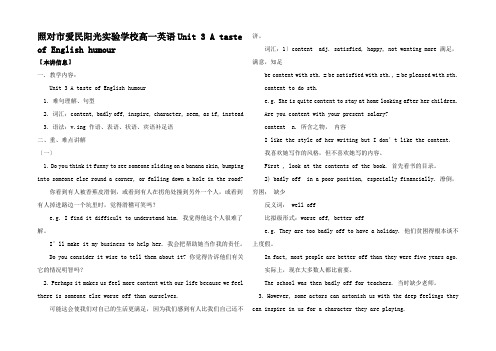
照对市爱民阳光实验学校高一英语Unit 3 A taste of English humour【本讲信息】一. 教学内容:Unit 3 A taste of English humour1. 难句理解、句型2. 词汇:content, badly off, inspire, character, seem, as if, instead3. 语法:v.ing 作语、表语、状语、宾语补足语二、重、难点讲解〔一〕1. Do you think it funny to see someone sliding on a banana skin, bumping into someone else round a corner, or falling down a hole in the road?你看到有人被香蕉皮滑倒,或看到有人在拐角处撞到另外一个人,或看到有人掉进路边一个坑里时,觉得滑稽可笑吗?e.g. I find it difficult to understand him. 我觉得他这个人很难了解。
I’ll make it my business to help her. 我会把帮助她当作我的责任。
Do you consider it wise to tell them about it? 你觉得告诉他们有关它的情况明智吗?2. Perhaps it makes us feel more content with our life because we feel there is someone else worse off than ourselves.可能这会使我们对自己的生活更满足,因为我们感到有人比我们自己还不济。
词汇:1〕content adj. satisfied, happy, not wanting more 满足,满意,知足be content with sth. = be satisfied with sth., = be pleased with sth. content to do sth.e.g. She is quite content to stay at home looking after her children. Are you content with your present salary?content n. 所含之物,内容I like the style of her writing but I don’t like the content.我喜欢她写作的风格,但不喜欢她写的内容。
高中英语必修四 Unit 3 A taste of English humour 要点解析

c s. 不要 满 足于这 样小 的成 功 。 es
I a no o e twi a tf 1d e ms m tc ntn t be u iu r a :1 h
【 比较 辨析 】 oqe,vro ,eet cn uroecmedf a
这些 动 词 均含 “ 服 . 胜 ” 意 。c n 征 战 之 o— q e 侧重 战胜 和控 制 。书面用 词 。o ecm ur vro e 多指 战胜 或克 服非 物 质 的东西 , 困难 和不 如 良习惯 等 。 气较 弱 也可 指在 斗争 或竞 争 中 语
w n e ui l elis 我 不 满 足 于美 丽 的 a t a tu ra t . b f ie 梦想 , 我要 的是 美丽 的现 实 。
【 知识拓展 】
b / fe o t n t e e l c n e t wi h= b s t f d / e ai i se
你 的论 点太 薄 弱 了不 能令 我信 服 。
I o l n’ c n i c h m t t c u d t o v n e i ha he wa s
w o g 我无 法 使他 明 白 自己错 了。 rn .
We t o c n ic i o h ln 我 r t o vn e hm fte pa . y
奶油 , 我们 只好 吃干 面包 了 。
Do tbe o t n t u h a s l U . n’ c n e twi s c mal S C h
其 他 问题就 好办 了。 T e eeo ecmew t sd es hyw r vro i a n s.他 们 h 悲 痛 欲绝 。
As h r S n u tr w h l a e t t e e’ o b t , e s al v o e h
高考英语(人教通用)大一轮复习满分必背必修四Unit3AtasteofEnglishhumour

Unit 3 A taste of English humourⅠ.常考单词必背1.content adj.满足的;满意的n.满足v t.使满足Is he content with his present achievement?他对目前的成就感到满意吗?The boy contents himself with an apple every day.这个男孩每天吃一个苹果来满足自己。
[快速闪记]content oneself with sth 满足于某事feel/be content with对……感到满意be content to do...愿意做……do sth to your heart's content 尽情地做某事2.astonish v t.使惊诧The news astonished everyone present at the meeting.这则消息使与会的每一个人感到惊讶。
It is astonishing how much the place has changed.这地方变化如此之大,真是令人吃惊。
[快速闪记](1)be astonished at对……感到惊讶be astonished to do sth 惊讶地干某事(2)astonished adj.感到惊讶的astonishing adj.令人感到惊讶的astonishment n.吃惊,惊讶3.entertain v t.& v i.使欢乐;款待He entertained us for hours with his stories and jokes.他既讲故事又说笑话,把我们逗乐了好几个小时。
[快速闪记](1)entertain sb with sth 用……使某人有兴趣(2)entertaining adj.使人愉快的;有趣的entertainer n.表演者entertainment n.娱乐(活动)4.throughout prep.遍及;贯穿ad v.到处;始终;全部This experience will be of value to them throughout their lives.这个经历对他们一辈子都将是宝贵的。
高三英语一轮复习优质学案9:Unit 3 A taste of English humour
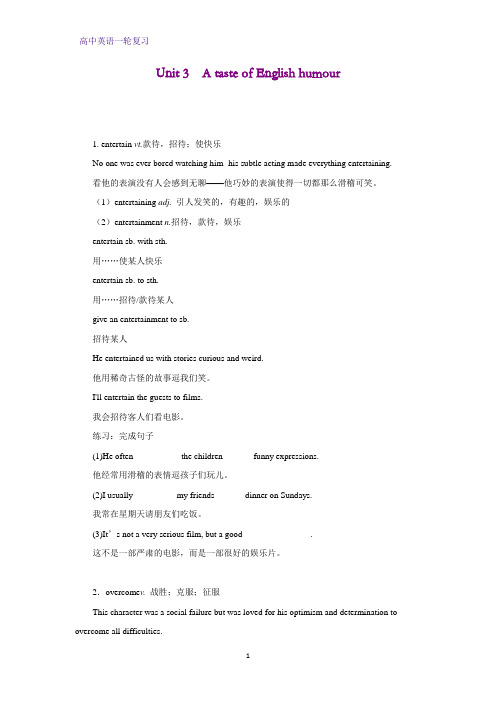
Unit 3 A taste of English humour1. entertain vt.款待,招待;使快乐No one was ever bored watching him -his subtle acting made everything entertaining.看他的表演没有人会感到无聊——他巧妙的表演使得一切都那么滑稽可笑。
(1)entertaining adj. 引人发笑的,有趣的,娱乐的(2)entertainment n.招待,款待,娱乐entertain sb. with sth.用……使某人快乐entertain sb. to sth.用……招待/款待某人give an entertainment to sb.招待某人He entertained us with stories curious and weird.他用稀奇古怪的故事逗我们笑。
I'll entertain the guests to films.我会招待客人们看电影。
练习:完成句子(1)He often __________ the children ______ funny expressions.他经常用滑稽的表情逗孩子们玩儿。
(2)I usually _________ my friends ______ dinner on Sundays.我常在星期天请朋友们吃饭。
(3)It’s not a very serious film, but a good _______________.这不是一部严肃的电影,而是一部很好的娱乐片。
2.overcome v. 战胜;克服;征服This character was a social failure but was loved for his optimism and determination to overcome all difficulties.这个角色是个社会生活中的失败者,但他乐观的精神和战胜困难的决心使他受到人们的喜爱。
英语:unit-3《a-taste-of-english-humour》课件(新人教版必修4)
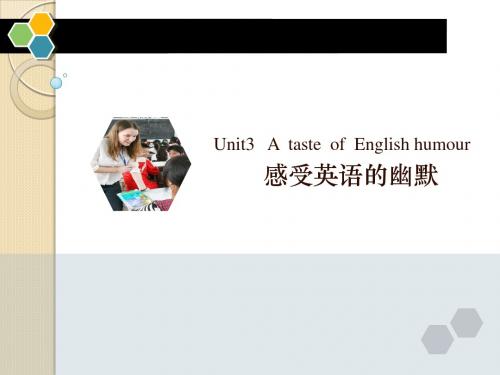
考纲知识预览
的 fortunately unfortunately fortune → adv.幸运地 → adv.不幸地→ ordinary n.机会,运气 bored boring 6. adj.平常的;普通 bore 的 entertain entertainment 7. adj.厌烦的→ entertaining adj.令人厌烦的→ vt.使厌烦 8. vt.& vi.使欢乐;款
(3)directly adv.直接地,也可作连词,引导 时间状语从句,意为“一……就……”。 ①The police officers had been directed to search the building. 警察奉命搜查这栋大楼。
名师一线讲坛
②Can you direct me to the post office? 你能指给我去邮局的路吗? ③At the sound of the gun,the birds flew in all directions. 听到枪声,鸟儿四处飞去。 ④Directly the teacher came in, everyone was quiet. 老师一进来大家都静了下来。 ⑤The next flight doesn’t go direct to Rome.It goes by way of Paris.下一
考纲知识预览
◦ 3.Unfortunately his father died, leaving the family even worse off,so Charlie spent his childhood looking after his sick mother and his brother.
高中英语 Unit 3 A taste of English humour 1 Warming Up

normal or serious into the unexpected or absurd.Humour in the form of
words may be either written or spoken.One of the most common kபைடு நூலகம்nds of
pleasure.A limerick is a short,humorous verse form consisting of five
lines usually with the rhyme scheme aabba;for example,
There was an Old Man who supposed
rather roundabout way,which has made him a family favourite.
译文:憨豆先生用一种迂回的、奇特的方式处理日常生活中的问
题,这使他成为一个家喻户晓的人物。
剖析:这是一个带有定语从句的复合句,which引导非限制性定语
从句,修饰整个主句。
单词注释
难句剖析
导读诱思
阅读短文,回答下列问题
1.What’s verbal humour?
答案:Verbal humour is the humour in the form of words.
2.What made Mr Bean a family favourite?
答案: His unique way of approaching everyday problems in a rather
Unit3 AtasteofEnglishhumour

slpoorvts emdeet.for
his
Up to now,thousands of books
(send) to that school.
导演;指示op;指t挥imadij.sm and determination to overcome all difficulties.(Page 18) 这
on occasion偶尔,有时
on the occasion of值此……之际
on no occasion绝不
occasionally adv.偶尔
单句填空
①I only go there occasionally (occasion) because it’s too far away
from my house.
2.failure n.失败(者) ②Professor Zhu replied
to the President’s opening remarks.
①We finally managed to make the customers
(convince) of the quality of the vehicle.
Unit 3 A taste of English humour
必修4
Unit 3 A taste of English humour
核心考点
随堂巩固
-2-
高频词汇 难点句型
1.humour n.幽默;滑稽 [教材原句] A taste of English humour(Page 17)品味英语幽默 a sense of humour幽默感 humorous adj.幽默的 [巧记]汉语中幽默是humo(u)r的音译。 用humour的适当形式填空 ①Mr.John was so humorous that we had a good laugh over the
- 1、下载文档前请自行甄别文档内容的完整性,平台不提供额外的编辑、内容补充、找答案等附加服务。
- 2、"仅部分预览"的文档,不可在线预览部分如存在完整性等问题,可反馈申请退款(可完整预览的文档不适用该条件!)。
- 3、如文档侵犯您的权益,请联系客服反馈,我们会尽快为您处理(人工客服工作时间:9:00-18:30)。
Unit3 A taste of English humour 单元教学目标目标语言Period 1 Warming up and pre-reading.Teaching procedure:Step 1: Lead-inShow some pictures to students, let them talk about the pictures and then ask them what they think of the pictures, whether they are funny or not.Questions: 1) Do you know who these comedians are? What makes them funny?2) Do you know other comedians who are funny in the same way?3) Have you seen any of these comedians or programmers? What do you think of them?Step 2: Warming upTask 1. Brain-stormingAsk students to name some types of humors they know. Write those they are not familiar with on the blackboard, then show some pictures and summarize.Task 2. TalkingAsk students to talk about some funny stories, any English or Chinese humors they know.Task 3. Reading on P22The purpose of the reading is to introduce the kind of verbal jokes. They use a “play on words” to be funny. Let students read the three jokes and then match the joke with the explanation. Then check the answer. After that, teacher can show some other jokes on the screen.Step 3 HomeworkAsk each student to give a joke and present it in class next period.Period 2 Reading.Step1 Reading. The purpose of this reading is to introduce nonverbal humor. This reading material takes Charlie Chaplin for example. It tells us what nonverbal humor means; what is Charlie Chaplin’s style of acting; how he made a sad situation entertaining and so on.Task 1.Fast reading.and do the true or false questions.1).Humor is always kind. F2).Charlie Chaplin was born in a rich family. F3). His silent movies are not popular any more. F4). He solved a sad situation by using nonverbal humor. T5).He ate the shoes because he thought that it was very funny.F6).Charlie Chaplin devoted his whole life to making films. TTask 2. Divide the text into several parts and give the main idea of each partPart one(1-2 ) It tells us that there are two kinds of humor. One is bad, while the other can inspire people.Part two (3-4): It tells us something about Charlie Chaplin’s acting style and how Charlie Chaplin made a sad situation entertaining.Part three (5): it gives us a short biography about Charlie Chaplin.Task 3. DiscussionLet students have a discussion about the text, then answer some questions.Questions: (1) What is behind fun?(2 ) Why did people like Little Tramp?(3 ) Do you think Charlie Chaplin’s eating boiled shoes funny? Why?Step 2 Language points:1.Do you find it funny to see someone sliding on a banana skin, bumping into someone else round a corner, or failing down a hole in the road?……find it funny to see……中的it 在此句中是形式宾语,to see…… 才是find的宾语。
当动词不定式作句子的宾语,同时,有一个形容词同宾语在一起时,我们常用it作先行宾语。
Eg: I find it difficult to understand him.We find it useful to learn a foreign language.slideThe book slid off my knee.He slid over the question without answering it.She slid out of the room when no one was looking.bump intoUnfortunately, the motorbike ~ed ~ a big tree.Mary was walking alone in the street when she ~ed ~ her teacher.cruelDon’t be ~ to animals.The death of their daughter was a ~ blow.2.Perhaps it makes us feel more content with our life because we feel there is someone else worse off than ourselves.1)content(adj):satisfied ,happy.常见的搭配是:be content with sth: be satisfied with sthbe content to do sth: be willing to do sthEg: She is content to stay at home looking after her children.Are you content with your living conditions?3.badly off: in a poor position. 潦倒;穷困。
其反义词是well off。
文中worse off 是badly off的比较级形式。
eg:They are too badly off to have a holiday.Many people are better off than before.4. astonishThe news he brought ~ed everyone in the class.He looked at me in ~ment.it is ~ing to me that she was late.5. However, some actors can astonish us with the deep feelings they can inspire in us for a character they are playing.Inspire(vt)~ sth in sb ---- ~ sb with sth :to fill sb with thoughts,feelings or aims 激励或鼓舞某人。
The father ~d his son with confidence.= The father ~d confidence in his son.这个句子中有两个定语从句:they can inspire in us修饰the deep feelings, they are playing 修饰a character。
不管怎样,有些演员能用他们所演的角色在我们身上鼓动起深深的感情来震撼我们。
cut off: to separate from others; to stop suddenly;切断;隔离;突然中止Eg: They cut off our food supply.cut in插嘴 cut out 剪除;删除cut up切碎 cut through刺穿(名题赏析)He was in hospital for six months. He felt asif he was __C__from the outside world.A. cut outB. cut offC. cut upD. cut through6.overcome 克服eg:We should have the courage to ~ any difficulty in the world.It is not easy to ~ a bad habit in a short time.7.be set ineg:The story is ~ ~ the early days of World war II.8.mouthfulHe took a ~ of the bitter medicine and made a face.I felt so full that I couldn’t eat another ~.basketful , handful, cupful, dishful, spoonful9.starTonight, we are showing a film, ~ring Charlie Chaplin.The director wants to ~ Jim in his film.she has ~red in a lot of good films.The Third Period GrammarTeaching procedure:Step 1. RevisionCheck homework: the exercises on page 20 and 21.Step 2. Word formationThere are ten suffixes in the chart. And there are some new words in it. But the purpose of showing this chart is to let students learn more about the adjective suffix.Step 3. Discovering useful structuresTask 1. RevisionHave a revision about the –ing form used as the subject and object. Give students some sentences to translate:(1) Talking to him is useless.(2) Smoking does harm to your health.(3) Walking is my sole exercise.(4) Collecting stamps is my hobby.(5) I suggested bringing the meeting to an end.(6) He admitted taking the money.(7) I couldn’t help laughing.(8) Your coat needs washing.Task 2. New usage of the –ing formAsk students to look at the Exercises 4 on page 20. And then wake in pairs to finish the exercises.Teacher checks the answers and give the explanations.1.A cooking pot: A pot that is used for cooking.2.A drinking horse: A horse that is drinking water.3.The man sitting on the sofa is a friend of my brother’s.Ø Here the –ing form are used as attribute.1.I saw the man sliding on a banner skin yesterday.2.Did you notice the man picking up that broken bottle and putting it in his bag?Ø Hear the –ing form are used as object complement The structure of the sentence with an object complement is: Subject + Predicate + Object + Object complement1.Her job is looking after babies.2.What he likes is playing chess after supper.Ø Here the –ing form are used as predictive. Pay attention to the differences between –ing form used as predicative and present continuous tense.(1) Her hobby is painting.(2) Her favorite sport is skiing.(3) This was very disappointing.(4) The test results are very discouraging.(5) She was very pleasing in her appearance.(6) His concern for his mother is very touching.(7) The photograph is missing.(8) The article was misleading, and the newspaper has apologized.In the first two sentences, the –ing form is used to show the character of the subject. In the next four sentences the words of the –ing form are all about the feelings. In the last two sentences, the words of the –ing form show some states and qualities.(9) It is snowing hard.(10) She is teaching in a night school.In these two sentences, the –ing form are used as the predicate in the present continuous tense.Step 4. Using StructuresTurn to page 56. Look at the Using Structure. There are two exercises in this part. Exercise 1 is to let students correct some errors in the sentences. This is not an easy job for most students, because it needs other knowledge, besides what the students learned today. So better leave them more time to do this exercise. For exercise 2, let students finish it in a short time. With the help of the pictures, students can easily understand the meaning and correctly use the –ing form to finish the blanks. Teacher can check the answers in class.Step 4. HomeworkFinish all exercises on page 56.The Fourth Period ListeningTeaching procedure:Step 1. Revision:Check homework:(1) Ask a couple of students to tell their jokes in class.(2 ) Ask some students to come to the blackboard to write their translation. After they have finished, teacher correct some errors with the whole class.Step 2. Listening ( page 23 )This is a funny story. Mary made some plum jam and left some in the pan. Five days later, her husband came home and poured the jam into the chicken. Later Mary came home and found all of her chickens were behaving strangely. What had happened? Give students two chances to listen to the story. First, go through Exercise1 and 2 to know what are the things they will do while listening. After that teacher plays the tape for them to finish Exercise 1. The second listening is to check the answers. For Exercise 2, teacher should leave some time for students to discuss the question.Questions: (1) Did you find this story funny? Give the reason.(2 ) What do you think of John’s behavior?Step 2. Listening ( page 55 )This is a story about a thief and a man. The situation is very interesting. Before listening, ask students what they would do if they find a thief in their home one day; whether they will be afraid of the thief and so on.There are three steps for this listening. At first let students read the questions to make sure that they know what they should do in this listening. Next, play the tape for the first time to let students finish Exercise 1. Then play the tape again and let the students finish the questions in Exercise 2. After that, let the students check their answers with each other. At last, listen to the tape again, teacher can make a pause where there is an question to the question, in this way students can check all the answers.Step 3. Listening ( page 58 )There are four exercises in this listening. The first one requests students to get the general idea of the material. The second one is to ask the students to know some details of the material. The third one is a question that asks the students to speculate the teacher’s feeling. And the last one is a good exercise, it gives the students another chance to practice their oral English.Step 4. HomeworkCollect as many funny stories as possible, do some preparations for the writing in the next period.。
